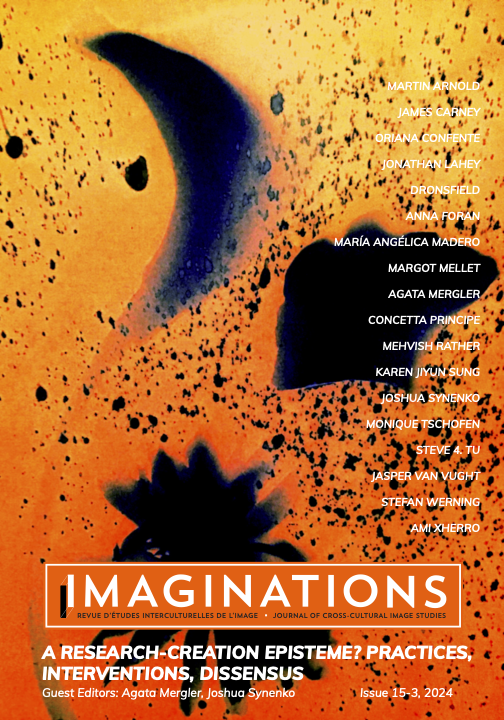Writing by No Longer Writing: Kittler's mediatic approach to modern writing
DOI:
https://doi.org/10.17742/IMAGE29725Abstract
This article explores the concept of "de-writing," which involves suspending writing, diverting it in order to better understand it in a research-creation approach. De-writing is then considered as a new regime of the act of writing, particularly in connection with digital media culture. The article analyzes the mediatic and ontological change of writing through the work of Friedrich Kittler. It examines how writing in collaboration with the machine calls into question the notions of originality and the primacy of the human in creativity. As an epistemological and performative model, the article introduces the idea of "misuse," where a use of a tool, format, or medium deviating from the use initially intended, allows to explore new modes of writing.
References
Benabou, Marcel. “Quarante siècles d'Oulipo”. Raison présente, vol. 134, no. 1, 2000, pp. 71-90. DOI.org (Crossref), https://doi.org/10.3406/raipr.2000.3611.
Crouzet, Thierry. “T'es pas techos, t'es pas artiste”. Thierry Crouzet, 8 May 2013, https://tcrouzet.com/2013/05/08/tes-pas-techos-tes-pas-artiste/.
Cruz, Maria Teresa. Media Theory and Cultural Technologies: In Memoriam Friedrich Kittler. 1st ed., Cambridge Scholars Publisher, 2017.
Goldsmith, Kenneth. Uncreative Writing: Managing Language in the Digital Age. Illustrated edition, Columbia University Press, 2011.
Griffin, Matthew, et al. “Technologies of Writing: Interview with Friedrich A. Kittler”. New Literary History, vol. 27, no. 4, Sept. 1996, pp. 731-42. DOI.org (Crossref), https://doi.org/10.1353/nlh.1996.0049.
Guez, Emmanuel, and Frédérique Vargoz. “La Mort de l'auteur Selon Friedrich Kittler”. Appareil, vol. 19, 2017. DOI.org (Crossref), https://doi.org/10.4000/appareil.2561.
Heidegger, Martin. Parménide: cours de Fribourg du semestre d'hiver 1942 - 1943. Edited by Thomas Piel and Manfred S. Frings, Gallimard, 2011.
Herbertz, Richard. Zur Psychologie des Maschinenschreibens. J. A. Barth, 1909.
Khayyat, E. “The Humility of Thought: An Interview with Friedrich A. Kittler”. Boundary 2, vol. 39, no. 3, Aug. 2012, pp. 7-27, https://doi.org/10.1215/01903659-1730599.
Kittler, Friedrich. “Exorciser l'homme Des Sciences Humaines : Programmes Du Poststructuralisme”. Appareil, translated by Slaven Waelti, vol. 19, 2017, https://doi.org/10.4000/appareil.2522<https://doi.org/10.4000/appareil.2522.
Kittler, Friedrich A. Aufschreibesysteme 1800/1900. 3., Vollst. überarb. Neuaufl, Fink, 1985.
---. Austreibung des Geistes aus den Geisteswissenschaften Programme des Poststrukturalismus. Paderborn, 1980.
---. Discourse Networks 1800/1900. Stanford University Press, 1990.
---. Draculas Vermächtnis: technische Schriften. 1. Aufl, Reclam, 1993.
Le Lionnais, François. “La LiPo. Le Premier Manifeste”. Oulipo, La Littérature Potentielle (Créations Re-Créations Récréations), Gallimard, 1973, pp. 19-21.
Marino, Mark C. Critical Code Studies. MIT Press, 2020.
McLuhan, Marshall. Understanding Media: The Extensions of Man. 1st MIT Press ed, MIT Press, 1994.
Montinari, Mazzino. “Nietzsche Briefwechsel. Kritische Gesamtausgabe”. Nietzsche-Studien, vol. 3, no. 1, Jan. 1975, https://doi.org/10.1515/9783110244243.374<https://doi.org/10.1515/9783110244243.374.
Shklovsky, Victor, and Gerald Burns. Theory of Prose. Translated by Benjamin Sher, Dalkey Archive Press, 1991.
Vitali-Rosati, Marcello. “Qu'est-ce que l'écriture numérique ?' Corela. Cognition, représentation, langage, no. HS-33, HS-33, Nov. 2020, https://doi.org/10.4000/corela.11759.
Published
How to Cite
Issue
Section
License
Copyright (c) 2025 Margot Mellet

This work is licensed under a Creative Commons Attribution-NonCommercial-NoDerivatives 4.0 International License.

This work by https://journals.library.ualberta.ca/imaginations is licensed under a Creative Commons 4.0 International License although certain works referenced herein may be separately licensed, or the author has exercised their right to fair dealing under the Canadian Copyright Act.




